This metapackage will install packages useful for using data modes, such as
RTTY and SSTV, including weak signal modes, such as JT65, with Debian.
Official Debian packages with high relevance
|
|
▾
|
comptext
|
1.0.1-6
|
Gui based tool to compare two text streams
|
comptext:
Gui based tool to compare two text streams
-


-
Comptext is used to compare two text streams. It's comparison function uses a
linear-programming technique. It computes total number of errors, the character
error rate (CER) and the bit error rate (BER).
- Maintainer
-
- Versions
-
- Popularity
-
- 15 regular users
-
94 recent
-
264 total installations
(of 280097 submissions)
- Debian
-
- Upstream
-
- Improve entry
-
|
|
▾
|
comptty
|
1.0.1-4
|
GUI based tool to compare two RTTY streams
|
comptty:
GUI based tool to compare two RTTY streams
-


-
Comptty is used to compare two RTTY streams. It's comparison function uses a
linear-programming technique. It computes total number of errors, the
character error rate (CER) and the bit error rate (BER). Special attention is
given to SHIFT and UNSHIFT to account for an error occurring in that character.
- Maintainer
-
- Versions
-
- Popularity
-
- 12 regular users
-
95 recent
-
267 total installations
(of 280097 submissions)
- Debian
-
- Upstream
-
- Improve entry
-
|
|
▾
|
flamp
|
2.2.07-1
|
ham radio Amateur Multicast Protocol application
|
flamp:
ham radio Amateur Multicast Protocol application
-
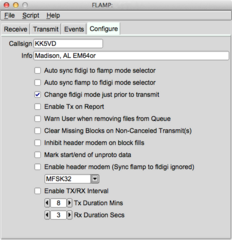

-
FLAMP is a program for AMP or Amateur Multicast Protocol. An FLAMP session
will transmit one or more files with one or more iterations of the
transmission. Each file is broken into blocks, each of which has a checksum.
The receiving station saves the blocks that pass the checksum. Successive
transmissions will fill in the missing blocks provided that the new blocks
pass the checksum. After the transmission sequence, the entire file is
assembled and may be saved. “Fills” may be provided by retransmitting the
entire file or by sending only the missing blocks.
- Maintainer
-
- Versions
-
- Popularity
-
- 15 regular users
-
97 recent
-
300 total installations
(of 280097 submissions)
- Debian
-
- Upstream
-
- Improve entry
-
|
|
▾
|
fldigi
|
4.2.11-1
|
digital modem program for hamradio operators
|
fldigi:
digital modem program for hamradio operators
-
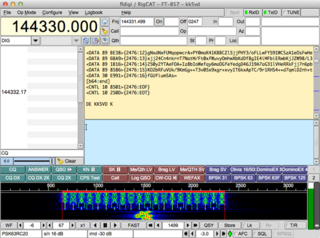

-
Fldigi is a modem program which supports most of the digital modes used
by hamradio operators today. You can also use the program for
calibrating your sound card to WWV or doing a frequency measurement test.
The program also comes with a CW decoder. Fldigi is written with the
help of the Fast Light Toolkit X GUI.
- Maintainer
-
- Versions
-
- Tags
-
✏
- hardware
- hamradio
- interface
- commandline, daemon, x11
- role
- program
- scope
- application
- uitoolkit
- fltk
- x11
- application
- Popularity
-
- 78 regular users
-
120 recent
-
566 total installations
(of 280097 submissions)
- Enhancements
-
- Debian
-
- Upstream
-
|
|
▾
|
flmsg
|
4.0.17-1
↺
New upstream version
4.0.24
available
|
amateur radio forms management editor
|
flmsg:
amateur radio forms management editor
-
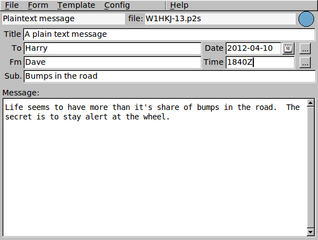

-
Flmsg is a simple forms management editor for the amateur radio supported
standard message formats, including ICS, HICS, MARS, IARU, Radiogram NTS,
Red Cross, and plaintext. Its data files are pure ASCII text that can
be sent from point to point using the internet, amateur radio, or other
electronic link.
- Maintainer
-
- Versions
-
- Popularity
-
- 17 regular users
-
95 recent
-
290 total installations
(of 280097 submissions)
- Debian
-
- Upstream
-
- Improve entry
-
|
|
▾
|
flwrap
|
1.3.6-1
|
amateur radio file encapsulation/compression utility
|
flwrap:
amateur radio file encapsulation/compression utility
-
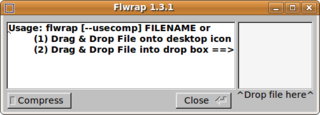

-
Flwrap is a small desktop application that encapsulates a text file,
an image file, or a binary file within a set of identifier blocks.
Flwrap is designed to be used to best advantage with fldigi but can
be used with any digital modem program.
- Maintainer
-
- Versions
-
- Popularity
-
- 19 regular users
-
96 recent
-
305 total installations
(of 280097 submissions)
- Debian
-
- Upstream
-
- Improve entry
-
|
|
▾
|
js8call
|
2.5.2+ds-1
|
Amateur Radio Digital Mode providing weak signal messaging
|
js8call:
Amateur Radio Digital Mode providing weak signal messaging
- Description
-
JS8Call is using the JS8 Digital Mode for providing weak signal keyboard to
keyboard messaging to Amateur Radio Operators.
JS8Call is an experiment to test the feasibility of a digital mode with the
robustness of FT8, combined with a messaging and network protocol layer for
weak signal communication on HF, using a keyboard messaging style interface.
It is not designed for any specific purpose other than connecting amateur
radio operators who are operating under weak signal conditions. JS8Call is
heavily inspired by WSJT-X, Fldigi, and FSQCall and would not exist without
the hard work and dedication of the many developers in the amateur radio
community.
- Maintainer
-
- Versions
-
- Popularity
-
- 64 regular users
-
116 recent
-
406 total installations
(of 280097 submissions)
- Debian
-
- Upstream
-
- Improve entry
-
|
|
▾
|
jtdx
|
2.2.159+improved-3
|
Weak-signal amateur radio communications, JTDX version
|
jtdx:
Weak-signal amateur radio communications, JTDX version
- Description
-
JTDX means "JT modes for DXing", it is being developed with main focus on the
sensitivity and decoding efficiency, both in overcrowded and half empty HF
band conditions. JTDX is forked from WSJT-X, a computer program dedicated to
amateur radio communication using very weak signals.
- Maintainer
-
- Versions
-
- Popularity
-
- 34 regular users
-
95 recent
-
300 total installations
(of 280097 submissions)
- Debian
-
- Upstream
-
- Improve entry
-
|
|
▾
|
multimon
|
1.0-7.1
|
Linux Radio Transmission Decoder
|
multimon:
Linux Radio Transmission Decoder
-
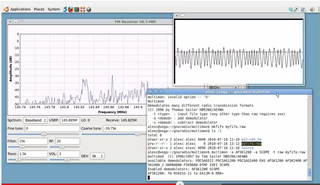

-
The multimon software can decode a variety of digital transmission modes
commonly found on UHF radio. A standard PC soundcard is used to acquire
the signal from a transceiver. The decoding is done completely in software.
Currently, the following modes are supported:
AX.25
1200 Baud AFSK
2400 Baud AFSK (2 variants)
4800 Baud HAPN
9600 Baud FSK (G3RUH)
POCSAG
512 Baud
1200 Baud
2400 Baud
Miscellaneous
DTMF
ZVEI
An arbitrary set of the above modes may run concurrently on the same input
signal (provided the CPU power is sufficient), so you do not have to know
in advance which mode is used. Note however that some modes might require
modifications to the radio (especially the 9600 baud FSK and the POCSAG
modes) to work properly.
POCSAG (Post Office Code Standards Advisory Group) is a common paging
transmission format.
This package is made with the original multimon. You probably want to
be running multimon-ng.
- Maintainer
-
- Versions
-
- Tags
-
✏
- hardware
- hamradio
- role
- program
- Popularity
-
- 21 regular users
-
97 recent
-
331 total installations
(of 280097 submissions)
- Debian
-
|
|
▾
|
multimon-ng
|
1.3.1+dfsg-1
↺
New upstream version
1.4.1
available
|
digital radio transmission decoder
|
multimon-ng:
digital radio transmission decoder
- Description
-
The successor to multimon, with support for more modes and improved
compatibility with moderns systems. It decodes the following digital
transmission modes commonly found on VHF/UHF bands:
POCSAG512 POCSAG1200 POCSAG2400
FLEX
EAS
UFSK1200 CLIPFSK AFSK1200 AFSK2400 AFSK2400_2 AFSK2400_3
HAPN4800
FSK9600
DTMF
ZVEI1 ZVEI2 ZVEI3 DZVEI PZVEI
EEA EIA CCIR
MORSE CW
X10
Multiple decoders can run concurrently on the same signal, which is
provided via a file or a pipe. Common setups are: a radio connected
via a sound card (may require modifications to the radio); samples
provided via a GNU Radio sink or the UDP audio stream in gqrx (via
netcat and sox).
- Maintainer
-
- Versions
-
- Popularity
-
- 73 regular users
-
119 recent
-
563 total installations
(of 280097 submissions)
- Debian
-
- Upstream
-
- Improve entry
-
|
|
▾
|
psk31lx
|
2.2-1
|
PSK31 terminal application with text-based user interface
|
psk31lx:
PSK31 terminal application with text-based user interface
-
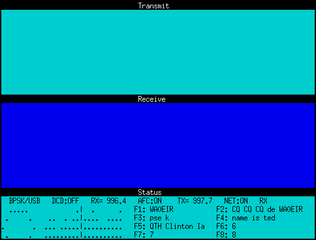

-
psk31lx is a simple text-based terminal program with a built-in phase scope
and spectrum analyzer to aid in signal tuning. It uses a sound card to receive
and transmit PSK31 tone.
- Maintainer
-
- Versions
-
- Popularity
-
- 12 regular users
-
95 recent
-
279 total installations
(of 280097 submissions)
- Debian
-
- Upstream
-
- Improve entry
-
|
|
▾
|
qsstv
|
9.5.8-6
|
Qt-based slow-scan TV and fax
|
qsstv:
Qt-based slow-scan TV and fax
-
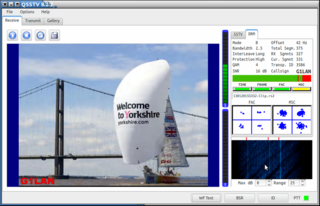

-
Qsstv is a program for receiving slow-scan television and fax.
These are modes used by hamradio operators. Qsstv uses a
soundcard to send and receive images.
- Maintainer
-
- Versions
-
- Tags
-
✏
- hardware
- hamradio
- interface
- x11
- role
- program
- scope
- utility
- uitoolkit
- qt
- works-with
- fax, image
- x11
- application
- Popularity
-
- 35 regular users
-
96 recent
-
451 total installations
(of 280097 submissions)
- Debian
-
- Upstream
-
|
|
▾
|
twpsk
|
4.3-2
|
Soundcard-based X program for operating PSK31
|
twpsk:
Soundcard-based X program for operating PSK31
-
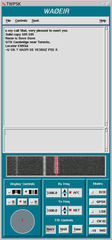

-
Twpsk uses a soundcard to receive and transmit PSK31, an extremely
narrow band HF-mode. PSK31 is a mode for keyboard QSO's. It offers
narrow signal width and gives excellent results with low power
and minimal antenna systems.
- Maintainer
-
- Versions
-
- Tags
-
✏
- hardware
- hamradio
- interface
- x11
- role
- program
- scope
- utility
- uitoolkit
- motif, ncurses
- x11
- application
- Popularity
-
- 13 regular users
-
100 recent
-
277 total installations
(of 280097 submissions)
- Debian
-
- Upstream
-
|
|
▾
|
wsjtx
|
2.7.0+repack-1
|
??? missing short description for package wsjtx :-(
|
wsjtx:
??? missing short description for package wsjtx :-(
- Maintainer
-
- Versions
-
- Tags
-
✏
- uitoolkit
- qt
- Popularity
-
- 121 regular users
-
105 recent
-
558 total installations
(of 280097 submissions)
- Debian
-
- Upstream
-
|
Official Debian packages with lower relevance
|
|
▾
|
hacktv
|
0+git20250218+ds-2
|
Analogue TV transmitter for the HackRF
|
hacktv:
Analogue TV transmitter for the HackRF
- Description
-
This is a program to generate a PAL/NTSC video signal from a video file or
test pattern. Input is any file type or URL supported by ffmpeg. Output can
be to a file or directly to a HackRF.
- Teletext support
- NICAM stereo audio
- Rudimentary Videocrypt I hardware support
- Maintainer
-
- Versions
-
- Popularity
-
- 13 regular users
-
97 recent
-
278 total installations
(of 280097 submissions)
- Debian
-
- Upstream
-
- Remark
-
This is a hardware-specific package.
- Improve entry
-
|
|
